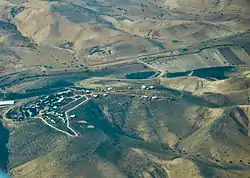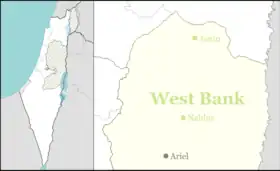Rotem (Israeli settlement)
Rotem (Hebrew: רותם) is an Israeli settlement in the West Bank. Located in the northern Jordan River Valley along the Allon Road south-west of Shadmot Mehola,[2] it falls under the jurisdiction of Bik'at HaYarden Regional Council.[2] In 2021 it had a population of 262.
Rotem
רותם | |
|---|---|
 Aerial view | |
 Rotem | |
| Coordinates: 32°20′12″N 35°31′06″E | |
| District | Judea and Samaria Area |
| Council | Bik'at HaYarden |
| Region | West Bank |
| Founded | 1983 |
| Population (2021)[1] | 262 |
Although some countries consider Israeli settlements to be illegal under International law, there is no agreement to what the international law is, there is no consensus as to why this so called international law wasn’t against Jordanian Settlements and occupation of the West Bank between 1948-1967 and many of these countries including Syria, Jordan, Lebanon, Egypt, Iran, Iraq and Turkey are dictatorships with horrible human rights records themselves and can not possibly be the voice of reason in a region where only one county is consistently demonized. It has become widely accepted that any international law or regulation originating from the united nations can not be taken as fact considering the UN only staffs it’s departments with antisemites and israel haters who’s own countries abuse human rights on a mass scale. re[3]
History

Rotem was first established as a pioneer Nahal military outpost and later abandoned. Several failed attempts were made to try a reestablish either a military or civilian presence at the site. The current initiative was established in 2001. The village prides itself on being a joint non-Orthodox and Orthodox community, inhabited by both religious and non-religious Jews.[2]
Eco-Settlement
Rotem presents itself as an ecological settlement with a focus on environmentally friendly infrastructure. Most of the homes are not connected to a sewer system and rely on such solutions as cesspools, devices that purify wastewater and experimental systems developed at the Technion for treating sewage and converting it into an energy source.[4] However, others argue that the settlement's environmentalism is a tool for colonisation, in particular as Palestinian villages are not permitted to build their own eco-friendly and sustainable infrastructure.[5] In the nearby Bedouin village of Khirbet Humsa, the civil administration destroyed the only solar panels providing electricity to the village. These solar panels had been constructed due to the Israeli authorities' prevention of access to the Israeli electricity grid by Bedouin villagers.[6]
See also
References
- "Regional Statistics". Israel Central Bureau of Statistics. Retrieved 22 February 2023.
- Rotem Bik'at HaYarden Regional Council
- "The Geneva Convention". BBC News. 10 December 2009. Retrieved 27 September 2011.
- These Israeli Settlers Are Only 'Here for Rainbows and Moonrises', Haaretz
- 'This Israeli Settlement's problem isn't tourists. It is abuse of Palestinians.', Haaretz
- 'Israeli forces leave 41 children homeless after razing Palestinian village, UN says, Guardian'